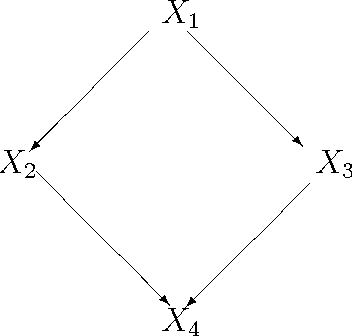Lp : A Logic for Statistical Information
Paper and Code
Mar 27, 2013
This extended abstract presents a logic, called Lp, that is capable of representing and reasoning with a wide variety of both qualitative and quantitative statistical information. The advantage of this logical formalism is that it offers a declarative representation of statistical knowledge; knowledge represented in this manner can be used for a variety of reasoning tasks. The logic differs from previous work in probability logics in that it uses a probability distribution over the domain of discourse, whereas most previous work (e.g., Nilsson [2], Scott et al. [3], Gaifinan [4], Fagin et al. [5]) has investigated the attachment of probabilities to the sentences of the logic (also, see Halpern [6] and Bacchus [7] for further discussion of the differences). The logic Lp possesses some further important features. First, Lp is a superset of first order logic, hence it can represent ordinary logical assertions. This means that Lp provides a mechanism for integrating statistical information and reasoning about uncertainty into systems based solely on logic. Second, Lp possesses transparent semantics, based on sets and probabilities of those sets. Hence, knowledge represented in Lp can be understood in terms of the simple primative concepts of sets and probabilities. And finally, the there is a sound proof theory that has wide coverage (the proof theory is complete for certain classes of models). The proof theory captures a sufficient range of valid inferences to subsume most previous probabilistic uncertainty reasoning systems. For example, the linear constraints like those generated by Nilsson's probabilistic entailment [2] can be generated by the proof theory, and the Bayesian inference underlying belief nets [8] can be performed. In addition, the proof theory integrates quantitative and qualitative reasoning as well as statistical and logical reasoning. In the next section we briefly examine previous work in probability logics, comparing it to Lp. Then we present some of the varieties of statistical information that Lp is capable of expressing. After this we present, briefly, the syntax, semantics, and proof theory of the logic. We conclude with a few examples of knowledge representation and reasoning in Lp, pointing out the advantages of the declarative representation offered by Lp. We close with a brief discussion of probabilities as degrees of belief, indicating how such probabilities can be generated from statistical knowledge encoded in Lp. The reader who is interested in a more complete treatment should consult Bacchus [7].
 Add to Chrome
Add to Chrome Add to Firefox
Add to Firefox Add to Edge
Add to Edge